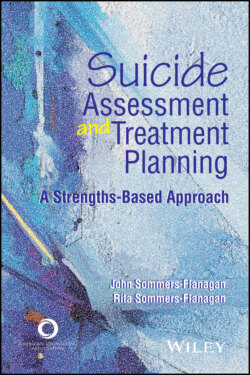Читать книгу Suicide Assessment and Treatment Planning - John Sommers-Flanagan - Страница 13
Emotional Responses to the Topic of Suicide
ОглавлениеWe began facilitating workshops, lectures, and trainings on suicide assessment and intervention in the 1990s. One presentation stands out. We asked about 80 school and mental health professionals, “How many of you have worked with clients or students who are suicidal?” Nearly everyone raised their hand. We followed up with, “How many of you have worked with a client who died by suicide?” About 15 hands went up. We asked how many had faced more than one client death by suicide; a few hands hesitantly went up. After thanking the group, we shared our own experiences and then transitioned to talking about coping strategies for professionals when clients complete suicide.
While talking, we noticed activity in the back of the room. Rose, a colleague we knew well, stood up and slipped out. Rose was a licensed mental health professional, an unflappable woman with a reputation for working with the toughest teens in town. We did not make much of her exit, but later Rose contacted us. “Sorry about leaving. You got to me. When you started talking about clients dying, I had to get out. I’ve had too many. Maybe I haven’t dealt with some of my losses.”
Regardless of your experience, suicide is a difficult topic, and emotional reactions run deep. Your own reactions may link to values, religious beliefs, losses, or future fears. Maybe you have had a friend, client, or family member die by suicide. In such situations, waves of painful emotions might come up whenever suicide is mentioned. Or you may struggle with suicidal thoughts yourself. No matter your background, conversations about suicide will activate or trigger your unique emotional response. Gaining experiences can reduce the intensity of your emotional responses to suicide scenarios, but there is also a chance it might magnify them. Either way, recognizing and having a plan for coping with your emotional responses will make you a more competent, ethical professional (Corey et al., 2018).
